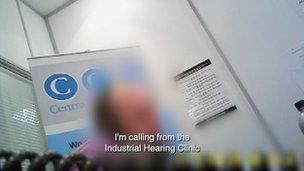Cold-call firms flout rules that block telemarketers
- Published

Call centre employees said they were ringing from a fictional Industrial Hearing Clinic
It is the scourge of the dinner hour. The cold call from a telemarketer just as the family is sitting down to eat. But secret filming by the BBC's Panorama programme found that some firms are not just bending the rules meant to protect people, they are tearing up the rule book entirely.
Tony Clark's home phone number is ex-directory. The 64-year-old has also signed up to a scheme designed to block most cold calls from telemarketing firms - known as the Telephone Preference Service.
The problem is that the calls just keep coming - and coming.
Mr Clark says salespeople from one firm in particular were very persistent in ringing.
They said they were given his details by the Industrial Workers' Register. They were convinced that he needed to sue his employer for compensation related to industrial deafness. The trouble is, Tony Clark has been self-employed for 35 years and the Industrial Workers' Register does not exist.
"I'd like to know how they know about me, how they got my details," he said.
No penalties
Panorama went undercover to the firm that was cold-calling Mr Clark. It is based in Bury just outside Manchester, and is called Central Claims Group. Its website states that it specialises in accident compensation claims.
Secret filming in March of this year revealed employees telling people they were from the Industrial Hearing Clinic, which also does not exist. They said they had been referred by trade unions.
As to where they were getting the phone numbers, the secret filming found that employees were ripping pages out of the telephone directory. The rules require companies to cross-check their databases to ensure people who have asked not to be contacted are not targeted.
An employee was also recorded saying that they did not give the real name of their employer when they cold-called because it then left them vulnerable to complaints.

Secret filming captured call centre employees ripping pages from the telephone directory to cold-call
In a statement, Central Claims Group said it took its legal and regulatory obligations very seriously and did not condone the lapses filmed by Panorama. It said anyone behaving in the way Panorama filmed in March would be dismissed.
It added that since the filming, it had taken extensive measures to address the failings and that it had bought in legally acceptable data as a basis for contacting potential customers.
Like 17.5m other people in the UK, Mr Clark had signed up to the TPS to block cold-calling by UK-based firms.
The scheme is run for the government regulator by the Direct Marketing Association. The association's spokesman said it had seen a dramatic increase in complaints from members of the public unhappy about being cold-called by telemarketing firms.
Mike Lordan from the association said some firms simply chose to ignore the rules.
"We have no powers of enforcement - enforcement sits with the information commissioner," he added.
Mr Lordan said his association sent between 1,000-2,000 complaints to the commissioner's office each month, yet no penalty fines had been imposed in at least 18 months.
A spokesman for the Information Commissioner's Office said that until this year, it did not have suitable legal powers to act. And even now that it had the power to impose fines of up to £500,000, enforcing the rules was not easy given the vast amounts of money that companies which flouted the rules stood to make.
Simon Entwisle, director of operations for the Information Commissioner's Office, said: "At the moment we definitely are trying to take action against these individuals. We have only had the power to issue the fine since the end of January, so it's early days yet. The other thing I have to say is there's a lot of money to be made in this particular sphere."
'Computer problem'
Even if people have signed up for TPS, there is another cold-call danger that lurks in the form of websites that people may have visited.
Richard Lloyd from Which? Magazine said people were ticking a box giving companies consent to contact them when they browsed websites, creating a loophole for cold-calling companies.
"Even if you have signed up to the Telephone Preference Service now, it won't make a jot of difference to those companies that are buying and selling that information you gave to that website maybe years ago."
And while many of the companies across the UK that break the rules on cold-calling are at least offering legitimate products, others have fallen victim to scams.
Pamela Warner, a retired lecturer, was cold-called by a firm in India that claimed to be approved by software giant Microsoft. The man said he had spotted a problem on her computer which he would fix, for a fee.
"He just kept on and on intimating that he knew there was something wrong with the computer and he got quite bullying actually and sort of saying that he was trying to help me all the time," she said. The experience left her £120 out of pocket - plus an extra fee to a legitimate firm to make sure her computer was safe to use.
"It's left me feeling so vulnerable, and quite frightened of what might well still be on it."
<bold>Panorama: Call Centres Undercover, BBC One, Monday, 2 July at 20:30 BST and then available in the UK on the</bold> <link> <caption>BBC iPlayer.</caption> <url href="http://www.bbc.co.uk/programmes/b01klwhg" platform="highweb"/> </link>
- Published15 November 2010
- Published26 August 2010